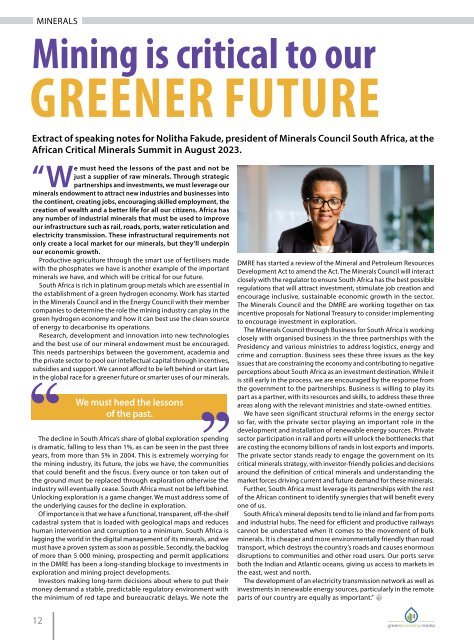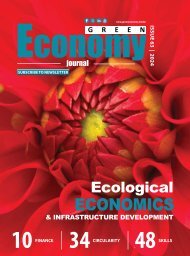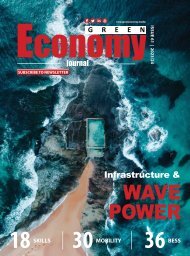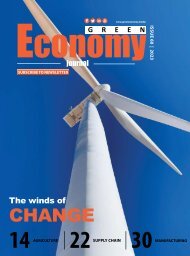Green Economy Journal Issue 62
Create successful ePaper yourself
Turn your PDF publications into a flip-book with our unique Google optimized e-Paper software.
MINERALS<br />
Mining is critical to our<br />
GREENER FUTURE<br />
Extract of speaking notes for Nolitha Fakude, president of Minerals Council South Africa, at the<br />
African Critical Minerals Summit in August 2023.<br />
“We must heed the lessons of the past and not be<br />
just a supplier of raw minerals. Through strategic<br />
partnerships and investments, we must leverage our<br />
minerals endowment to attract new industries and businesses into<br />
the continent, creating jobs, encouraging skilled employment, the<br />
creation of wealth and a better life for all our citizens. Africa has<br />
any number of industrial minerals that must be used to improve<br />
our infrastructure such as rail, roads, ports, water reticulation and<br />
electricity transmission. These infrastructural requirements not<br />
only create a local market for our minerals, but they’ll underpin<br />
our economic growth.<br />
Productive agriculture through the smart use of fertilisers made<br />
with the phosphates we have is another example of the important<br />
minerals we have, and which will be critical for our future.<br />
South Africa is rich in platinum group metals which are essential in<br />
the establishment of a green hydrogen economy. Work has started<br />
in the Minerals Council and in the Energy Council with their member<br />
companies to determine the role the mining industry can play in the<br />
green hydrogen economy and how it can best use the clean source<br />
of energy to decarbonise its operations.<br />
Research, development and innovation into new technologies<br />
and the best use of our mineral endowment must be encouraged.<br />
This needs partnerships between the government, academia and<br />
the private sector to pool our intellectual capital through incentives,<br />
subsidies and support. We cannot afford to be left behind or start late<br />
in the global race for a greener future or smarter uses of our minerals.<br />
We must heed the lessons<br />
of the past.<br />
The decline in South Africa’s share of global exploration spending<br />
is dramatic, falling to less than 1%, as can be seen in the past three<br />
years, from more than 5% in 2004. This is extremely worrying for<br />
the mining industry, its future, the jobs we have, the communities<br />
that could benefit and the fiscus. Every ounce or ton taken out of<br />
the ground must be replaced through exploration otherwise the<br />
industry will eventually cease. South Africa must not be left behind.<br />
Unlocking exploration is a game changer. We must address some of<br />
the underlying causes for the decline in exploration.<br />
Of importance is that we have a functional, transparent, off-the-shelf<br />
cadastral system that is loaded with geological maps and reduces<br />
human intervention and corruption to a minimum. South Africa is<br />
lagging the world in the digital management of its minerals, and we<br />
must have a proven system as soon as possible. Secondly, the backlog<br />
of more than 5 000 mining, prospecting and permit applications<br />
in the DMRE has been a long-standing blockage to investments in<br />
exploration and mining project developments.<br />
Investors making long-term decisions about where to put their<br />
money demand a stable, predictable regulatory environment with<br />
the minimum of red tape and bureaucratic delays. We note the<br />
DMRE has started a review of the Mineral and Petroleum Resources<br />
Development Act to amend the Act. The Minerals Council will interact<br />
closely with the regulator to ensure South Africa has the best possible<br />
regulations that will attract investment, stimulate job creation and<br />
encourage inclusive, sustainable economic growth in the sector.<br />
The Minerals Council and the DMRE are working together on tax<br />
incentive proposals for National Treasury to consider implementing<br />
to encourage investment in exploration.<br />
The Minerals Council through Business for South Africa is working<br />
closely with organised business in the three partnerships with the<br />
Presidency and various ministries to address logistics, energy and<br />
crime and corruption. Business sees these three issues as the key<br />
issues that are constraining the economy and contributing to negative<br />
perceptions about South Africa as an investment destination. While it<br />
is still early in the process, we are encouraged by the response from<br />
the government to the partnerships. Business is willing to play its<br />
part as a partner, with its resources and skills, to address these three<br />
areas along with the relevant ministries and state-owned entities.<br />
We have seen significant structural reforms in the energy sector<br />
so far, with the private sector playing an important role in the<br />
development and installation of renewable energy sources. Private<br />
sector participation in rail and ports will unlock the bottlenecks that<br />
are costing the economy billions of rands in lost exports and imports.<br />
The private sector stands ready to engage the government on its<br />
critical minerals strategy, with investor-friendly policies and decisions<br />
around the definition of critical minerals and understanding the<br />
market forces driving current and future demand for these minerals.<br />
Further, South Africa must leverage its partnerships with the rest<br />
of the African continent to identify synergies that will benefit every<br />
one of us.<br />
South Africa’s mineral deposits tend to lie inland and far from ports<br />
and industrial hubs. The need for efficient and productive railways<br />
cannot be understated when it comes to the movement of bulk<br />
minerals. It is cheaper and more environmentally friendly than road<br />
transport, which destroys the country’s roads and causes enormous<br />
disruptions to communities and other road users. Our ports serve<br />
both the Indian and Atlantic oceans, giving us access to markets in<br />
the east, west and north.<br />
The development of an electricity transmission network as well as<br />
investments in renewable energy sources, particularly in the remote<br />
parts of our country are equally as important.”<br />
12

















